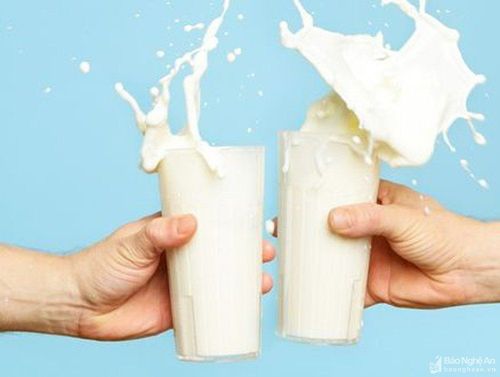This is an automatically translated article.
“Should you give your child one type of milk forever” is a question that many parents are concerned about, because milk is an important part of a child's diet, helping children to develop comprehensively. Refer to the following article to help you answer the above question.
1. Should children drink 1 type of milk forever?
There are many different types of milk, suitable for each growth stage of the child. During the period of rapid growth, the nutritional needs of children will increase. Cow's milk is a nutrient-rich food that babies need to support their overall development. Specifically, cow's milk is a good source of B vitamins, including vitamin B12, which supports red blood cells, and B2 that helps convert food into energy. Whole milk and other dairy foods provide the macronutrients, calcium and phosphorus that help children build strong bones and teeth. The fat in whole milk provides important calories for young children's activities. This is important because children are not capable of consuming large amounts of food but need to ensure adequate nutrients to meet their needs.
For toddlers, offering whole milk or whole milk is necessary. There is usually no need for toddler formula. There are no studies that show formula milk has any advantages over cow's milk. Protein, fat, carbohydrates, and calcium in toddler formula did not have a clear advantage over cow's milk in infants on a sensible weaning diet.
Soy milk (except fortified soy products and soy formulas if specifically indicated) and other milk alternatives such as goat or sheep milk, coconut milk and almond milk are not suitable for children under 2 years old. Rice milk and oat milk can be used after 12 months of age. However these products should be used under the supervision of a medical professional. Other forms of protein and vitamin B12 must also be included in the diet.
When the child is 2 years old, parents can give the child partially skimmed milk as long as the child is eating well and is growing at a rate appropriate for the child's age. Whole skim milk is not recommended until children are over 5 years old.
Therefore, "should children drink one type of milk for a long time" or "should children drink two types of milk at the same time", the answer is no. Because each type of milk contains different nutritional components, suitable for the digestive system of children of different ages. Therefore, in the process of raising children, parents need to know which milk is safe and suitable for their nutritional needs so that the child can develop comprehensively.
2. What happens when children drink too much milk?
Drinking too much milk can cause imbalance by the following mechanisms:
Too much energy for the child; Excess calcium supply; Fiber deficiency. Children who drink too much milk can experience the following complications:
Children always feel full because of the high fat content in milk. Therefore, they are often less interested in other foods that the body needs for growth. Children have difficulty absorbing iron and so the iron stores in the body decrease. The high calcium content from milk interferes with iron absorption. Babies are at increased risk of constipation because milk replaces high-fiber foods. For babies over 12 months of age, solid foods should be considered the main source of nutrition. This helps children maintain a varied and healthy diet, similar to adults.

Trẻ bị thừa cân và vấn đề có nên cho trẻ uống một loại sữa có sự liên quan với nhau
3. Maintain a balanced diet for children
Milk is undeniably a food that provides a lot of nutrients, but it is only part of a healthy diet that children need. Similar to adults, babies or toddlers need a balance between groups of substances such as carbohydrates, fats, and proteins. Diversification is needed to meet the nutritional needs of children and prevent constipation.
Some foods rich in beneficial carbs include:
Green vegetables; Whole grains ; Bean. Foods rich in lean protein such as fish, red meat, chicken, eggs and soy are suitable for children. Vegetable oils, beans, and peanut butter are good sources of healthy fats for kids.
In short, parents should not give their children one type of milk forever, because each type of milk contains different nutritional components, suitable for the digestive system as well as the child's development stage. Therefore, in the process of raising children, parents need to know which milk is safe and suitable for their nutritional needs so that the child can develop comprehensively.













